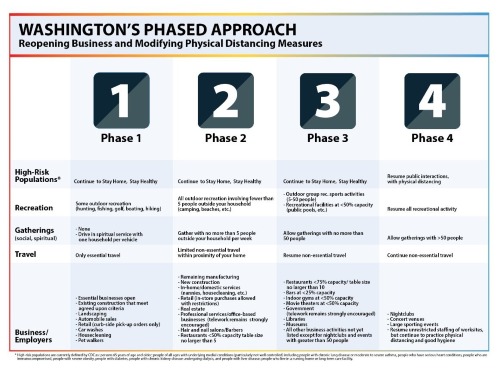City Hall and Coronavirus Updates

Friends and Neighbors, It’s been a busy two weeks since our last update. In addition to plenty of activity at City Hall and in District 4, Governor Inslee announced today he is extending Washington’s “Stay Home, Stay Healthy” order to May 31st and outlined a four-phase plan for reopening the economy. For more information, CLICK HERE and HERE. The Governor is also relaxing some COVID-related restrictions, including reopening our state parks and allowing hospitals to resume non-urgent procedures. Our Governor, King County health officials, and Mayor agree we must continue social distancing, washing hands, wearing masks when social-distancing cannot be maintained, and taking other steps to reduce transmission of the coronavirus. With our region making great strides to reduce the spread of COVID in our community, now is not the time to become overly confident. It’s hard on everyone but our Seattle success in using scientific data to determine our response has been lauded recently in both The Washington Post and The New Yorker magazine. More importantly, maintaining sharp focus now could prevent a second disease peak and save more lives later in the year. Like you, I look forward to re-starting our dynamic economy, getting folks back to work and school, and reconnecting with neighbors. Thank you for
all your hard work to keep our community safe.
UPDATES ON COVID-19 PANDEMIC AND RELIEF
Announcements from Mayor Durkan, Governor Inslee, and D.C.
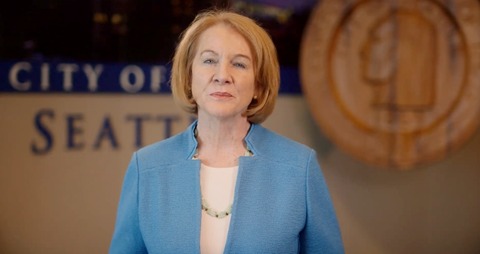
During the COVID-19 pandemic, Seattle has been fortunate to have the steady leadership of Mayor Jenny Durkan (pictured here) as well as King County Executive Dow Constantine and Governor Jay Inslee.
CITY:
- Deficit: Due mainly to less revenue from less economic activity, our City Budget Office (CBO) currently estimates an ongoing budget deficit of approximately $300 million out of our $1.7 billion General Fund and related accounts. For the April 22 presentation by CBO, CLICK HERE. The city government’s emergency funds are only $125 million. Cost savings, such as rolling back the new pay raises for the highest-paid city government workers, may be necessary. Subject to hearing more from constituents and conferring with my city government colleagues, I want to make sure we preserve human services and public safety. (Note: the entire city government spends $6.5 billion each year, but that grand total includes our utility operations and capital improvement / infrastructure programs, while city budget officials typically focus on the more flexible “General Fund” dollars.)
- Aid from Federal and State: City Council invited the City Budget Office to detail the initial $170 million Seattle is receiving from the federal and state governments so far. For the April 27 presentation, CLICK HERE. This amount does NOT include the loans backed by the federal government to small and large businesses or the grants to Washington State government to boost our State’s unemployment insurance benefits paid to those laid off due to the COVID crisis. It also does NOT include grants that our transit agencies will receive from the federal CARES Act: $243 million for King County Metro (buses) and $166 million for Sound Transit. In addition, we expect the federal government to provide more funding focused on repairing / constructing infrastructure and other stimulus spending. As a piece of the $170 million, Mayor Durkan transmitted legislation to the City Council deploying $14 million for food assistance, rent relief, investments in shelter and services for those experiencing homelessness, and additional funding for our City’s Small Business Stabilization Fund. To read more, CLICK HERE.
- Restaurant Relief: In conjunction with the Mayor’s office, City Council has passed an emergency order to support local restaurants by capping commissions charged by for-profit food delivery companies. To read more, CLICK HERE.
STATE: As stated earlier, Governor Inslee announced today he is extending Washington’s “Stay Home, Stay Healthy” order to May 31st and announced a four-phase plan for reopening the economy. For more information, CLICK HERE or HERE or HERE for the various news articles. The Governor also announced he is relaxing some COVID-related restrictions, including reopening our state parks and allowing hospitals to resume non-urgent procedures. To follow Governor Inslee’s updates, CLICK HERE.
FEDERAL: Last week Congress passed the 4th coronavirus relief bill, which allocates $484 billion in funds to small businesses and hospitals. $75 billion will go toward hospital funding and $25 billion toward increasing coronavirus testing. Of the remaining funds, $321 billion will be infused into the Paycheck Protection Program and $60 billion will be provided for economic disaster loans for small businesses. For more information, CLICK HERE.
The federal government can create and increase its own budget deficits and often increases spending to stimulate the economy (fiscal policy). State and city governments, however, are required to have balanced budgets.
Additional Support for our Small Businesses
I have heard from small businesses facing economic harm and I am actively looking for ways to get extended relief to those who have suffered financial losses or have been otherwise negatively impacted by COVID-19. As part of these efforts, the City will direct $1.5 million more to the Office of Economic Development’s (OED) Small Business Stabilization Fund. This will allow OED to provide $10,000 grants to 150 more micro-businesses (with 5 or fewer employees) financially impacted by COVID-19. During the first round, City Hall awarded grants to 250 small businesses from our original $2.5 million allocation. For the 2nd round OED will select awardees from the thousands of applicants that did not receive funding in the first round. Our Stabilization Fund is funded and supported by the private sector, philanthropic partners, and economic relief from flexible funding from federal government and is in addition to the aid the federal government is providing through its SBA loans, including Economic Injury Disaster Loans (EIDL), the Paycheck Protection Program (PPP), SBA Express Bridge Loans, and SBA Debt Relief. Any small business has an opportunity to apply for these federal loans, free of charge. OED offers free
SBA technical assistance Call OED at (206) 684-8090 from Monday to Friday 9 a.m. to 5 p.m. or email OED at oed@seattle.gov anytime. When you call, you can ask for an interpreter. Predatory scams tend to target immigrant- and refugee-owned businesses, taking advantage of either language barriers or misinformation. If contacted by a scammer, OED recommends businesses report scams to the Washington State Office of Attorney General, by calling 1-800-551-4636 from Monday to Friday 10 a.m. to 3 p.m. or by completing a claim.
Where to Find Updates on COVID and Relief
The Seattle City Council continues to update its COVID-19 webpage (CLICK HERE), which includes resources supporting workers, childcare, small businesses, and tenants/landlords.
You can also visit Mayor Jenny Durkan’s centralized COVID-19 webpage by CLICKING HERE, as well as the Mayor’s blog for additional updates. Additionally, our Seattle Office of Immigrant and Refugee Affairs has been translating and sharing information on COVID-19 in several languages. For links to OIRA’s fact sheets and other translated materials, go to their blog: https://welcoming.seattle.gov/covid-19/
And for the latest from Public Health Seattle-King County you can visit their website to track our region’s response to the virus by CLICKING HERE.
DISTRICT 4 UPDATES
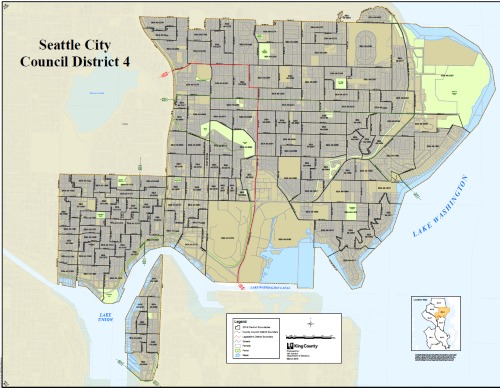
D-4 Community Council “Presidents Summit”
On April 29, I held a virtual meeting with over 20 District 4 community council leaders representing our neighborhoods in District 4 from Eastlake to Wallingford to Magnuson Park. Priorities discussed included crime prevention, pedestrian safety, public input on real estate development projects, COVID-19 response, homelessness in our parks, the U District BIA (business improvement area), the city budget and future economic needs, bus service and future bus lines, and concerns about upzones and other City Hall policies that can lead to commercial and residential displacement if mitigants are not put in place first. Normally, our office attends community council meetings in person each month, but the social distancing requirements of the COVID-19 emergency led many community councils to cancel their meetings. Our D-4 Presidents Summit enabled these leaders not only to convey their current priorities but also to learn about the priorities of their fellow leaders throughout District 4. Often there is common ground across neighborhoods for how they can increase participation and get results from City Hall. Attending community council meetings in your neighborhood is a great way to stay engaged. To participate, e-mail me at Alex.Pedersen@seattle.gov and my office will connect you to your community council. While participation in a larger group like a community council can amplify your voice and help you keep track of the many city government issues, there are many other ways to communicate your views. Please see the end of this e-newsletter for other ways to engage with your Councilmembers.
TRANSPORTATION
Councilmember Pedersen’s Citywide Bridge Audit

When rapidly expanding cracks forced the closure of the West Seattle Bridge, I raised questions about the condition and maintenance of other bridges owned by the City of Seattle as Chair of our City Council’s Transportation and Utilities Committee. I called upon our independent City Auditor, David G. Jones, to assess the condition of our City’s major bridges and the funding and policies for preventive maintenance. The auditor has agreed to produce a preliminary report on our bridges by September 2020 to inform the Council’s 2021 budget decisions. For my full press release, CLICK HERE, and here’s an excerpt:
“In a city surrounded by several waterways, our bridges are the backbone of Seattle’s infrastructure for its residents and local economy and are vital for transit, freight, and other uses,” said Pedersen. “Bridges require relatively large investments to build and maintain to ensure they remain safe for generations. The rapid deterioration of the West Seattle Bridge</a > underscores the need for City officials and the general public to have a clear, thorough, and independent understanding of the condition of major bridges throughout Seattle, including preventative maintenance investments and practices.”
To read the April 23 audit letter, CLICK HERE. The Seattle Times published an article about the audit request; to read it, CLICK HERE. The Seattle Times editorial board wrote, “One step to restoring trust is an audit of citywide bridge maintenance, requested last week by new City Councilmember Alex Pedersen.” To read their editorial, CLICK HERE.
UTILITIES
Utility Rate Relief for 2021
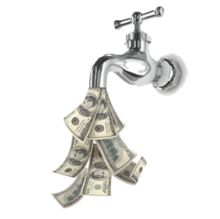

When I was appointed by my Council colleagues to serve as Chair of our Transportation and Utilities Committee, I announced my top priority was to keep utility rates as low as possible for Seattle residents. We are fortunate that our city government owns and operates the two major utility operations: Seattle City Light (SCL) for electricity and Seattle Public Utilities (SPU) for fresh water, sewer, and solid waste (including recycling). As utility fees imposed by our city government can contribute to Seattle’s affordability crisis, we have a responsibility to keep costs and rates low to help our residents afford their bills and to prevent economic displacement. During the COVID pandemic, we have been quick to reaffirm our no-shut-off policy, pass an emergency ordinance to get rid of late fees during the pandemic, and to make it easier to benefit from the Utility Discount Program. While both SCL and SPU were planning to complete their strategic plans and revise rates again for 2021, both departments have agreed to keep rates steady for 2021 for both electricity and tap water. (SPU rates for sewer, garbage collection, and recycling services are on a separate schedule, with sewer rates subject to King County actions on waste water treatment.) For more on the relief from utility bills during the COVID emergency, CLICK HERE.
Recycling in District 4
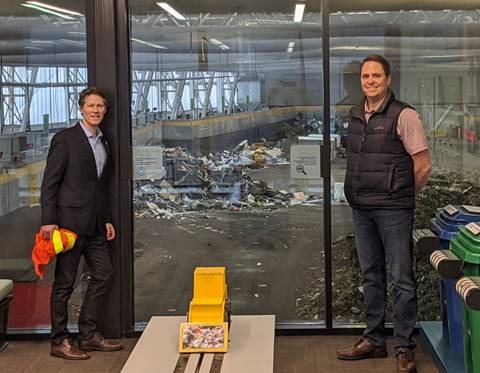
I spent part of Earth Day with the essential workers at Seattle Public Utilities who tackle the compost and garbage at the City Of Seattle North Transfer Station in Wallingford.
We need YOU to help us recycle locally and effectively. For the website on how best to recycle, CLICK HERE and for brochure called “Where Does It Go?” on what to recycle, CLICK HERE. (Seattle Public Utilities mails this to customers each year.) The challenges and future of recycling in Seattle and beyond were highlighted recently by a Seattle Times article. Sustainable recycling requires all of us to dispose of recyclables “Empty, Clean, and Dry.” We also need the companies that sell the products to take more responsibility for the disposal, which they can do by manufacturing more environmentally friendly materials, contributing funds to defray the cost of clean up, and developing other means to mitigate the problem.
YOUR CITY COUNCIL
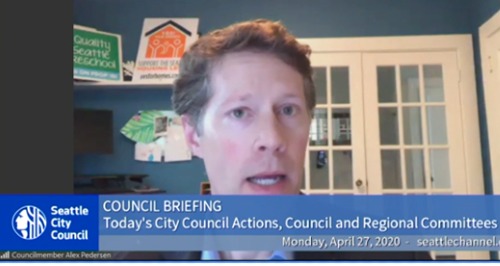
Opposing Councilmember Sawant’s New Tax on Seattle Employers
This week Councilmember Teresa Mosqueda chaired the Budget Committee to discuss the controversial proposal from Councilmembers Sawant and Morales to impose a new tax on over 800 employers, which I believe has been falsely advertised as an “Amazon Tax.” After conducting research and consulting with many constituents, I have been vocal about why I oppose a new tax on jobs as our local economy heads into a deep recession. Partnering with an economist from Governor Inslee’s Council of Economic Advisors, I published an Op Ed in the Seattle Times outlining the top 10 reasons why this tax should be rejected. Mayor Durkan also recently reinforced her opposition to the tax, which is significant because this version of the legislation cannot take effect without the Mayor’s signature. For links to the legislation, my Op Ed, and Councilmember Sawant’s reasoning, CLICK HERE.
Land Use Issues
Striving to Preserve Public Input on Real Estate Developments (CB 119769)
Thank you to everyone who contacted me about Council Bill (CB) 119769 regarding public input on proposed real estate developments throughout Seattle. Under State of Washington and City of Seattle emergency declarations related to the COVID-19 pandemic, the city’s design review boards stopped meeting in March. In response to the delay, the Durkan Administration proposed CB 119769 to skip the oversight of the design review boards, so that Seattle’s Department of Construction and Inspections (SDCI) can temporarily use a watered-down version called “administrative design review.” For a link to bill and the many amendments, CLICK HERE.
After listening to various sides of the proposal, I voted No on the bill. Here are the remarks I delivered at the Council meeting on Council Bill 119769:
- “…I’d also like to thank the many constituents who have written with their views on the legislation. Whether they are for or against this Council Bill, they clearly care about land use policies, real estate projects, their neighborhoods, and our city.
- I also appreciate the various amendments from my Council colleagues to try to make the legislation better.
- To be consistent with my vote last week and, based on my many years of experience in the field of commercial real estate finance, I will be voting No again because:
- I don’t think it meets the requirements of an emergency.
- I’m concerned that it reduces input and discussion from the general public.”
While the bill initially failed to get the 7 votes need to pass as an “emergency” on April 20, there was an unusual “motion to reconsider” and Councilmember Tammy Morales switched her vote on April 27 to pass the bill. Councilmember Lisa Herbold and I voted against the bill both times. I will do my best to monitor projects in District 4 to make sure SDCI considers public input, even without the benefit of the citizen design review boards.
Reauthorization Coming for U District Business Improvement Area (BIA):
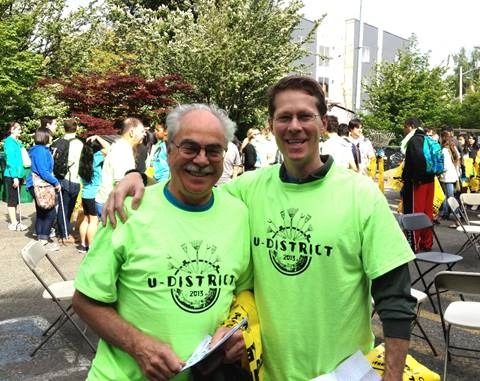
As a Legislative Aide to City Council in 2013, I participated in the annual clean up for the University District with community council leader Ruedi and other residents. The BIA is a neighborhood tool for a massive increase in cleaning and other services.
The University District Business Improvement Area, known as “BIA” for short, is up for reauthorization in June because the current BIA is expiring. The U District BIA imposes a fee to provide cleaning, safety, and marketing services and, if reauthorized, will have an added mission of preventing displacement of the neighborhood’s funky small businesses. On Monday, April 27, the City Council passed two Resolutions launching the BIA renewal process with Resolution 31943 and Resolution 31944 and introduced the Council Bill 119779. Here is the proposed meeting schedule:
- Wednesday, May 20: Briefing and Discussion at the Community & Economic Development (CED) Committee
- Wednesday, May 27: another discussion at CED Committee AND a public hearing
- Wednesday, June 3: possible approval by CED Committee
- Monday, June 8: possible adoption by full City Council
Please note the May 27th public hearing (likely to be held remotely due to COVID-19 social distancing). I encourage your input and welcome your feedback. Additionally, the City has set up a dedicated email address to handle comments: udistrictbia@seattle.gov. For instructions on how to register and call in for the Committee meetings or public hearing, CLICK HERE. For the map of the impacted area, CLICK HERE, and for my blog post with more details, CLICK HERE.
WE WANT TO HEAR FROM YOU
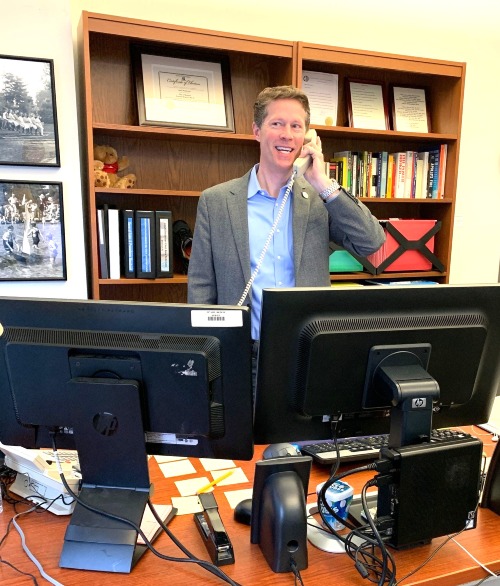
City Council Meetings on the Internet
Listening: Even though City Council is not currently holding meetings in person in order to follow public health guidelines, you can still follow along by listening on your computer or phone here, or listening on your phone by calling 206-684-8566. Commenting: You can also submit public comment by emailing your comment to council@seattle.gov to reach all 9 Councilmembers. Please remember to add “For City Council Meeting” in the comments. Now you can also phone into the meeting to speak directly to the Council live. For the instructions on how to register and call in, CLICK HERE.
Virtual Meetings with Your Councilmember Pedersen
I continue to have virtual in-district office hours so we can chat by telephone or via Skype. Please continue to sign up through my website or by CLICKING HERE so I can hear your ideas, concerns, and requests. You can also just send an e-mail to alex.pedersen@seattle.gov
For previous e-newsletters, visit my blog by CLICKING HERE.
Hunker down, chin up — and soap up your Seattle hands. We will get through this together, Emerald City. With gratitude — and community fortitude,

Councilmember Alex Pedersen Seattle City Council, District 4
Email: Alex.Pedersen@seattle.gov
Phone: (206) 684-8804
Find It, Fix It


